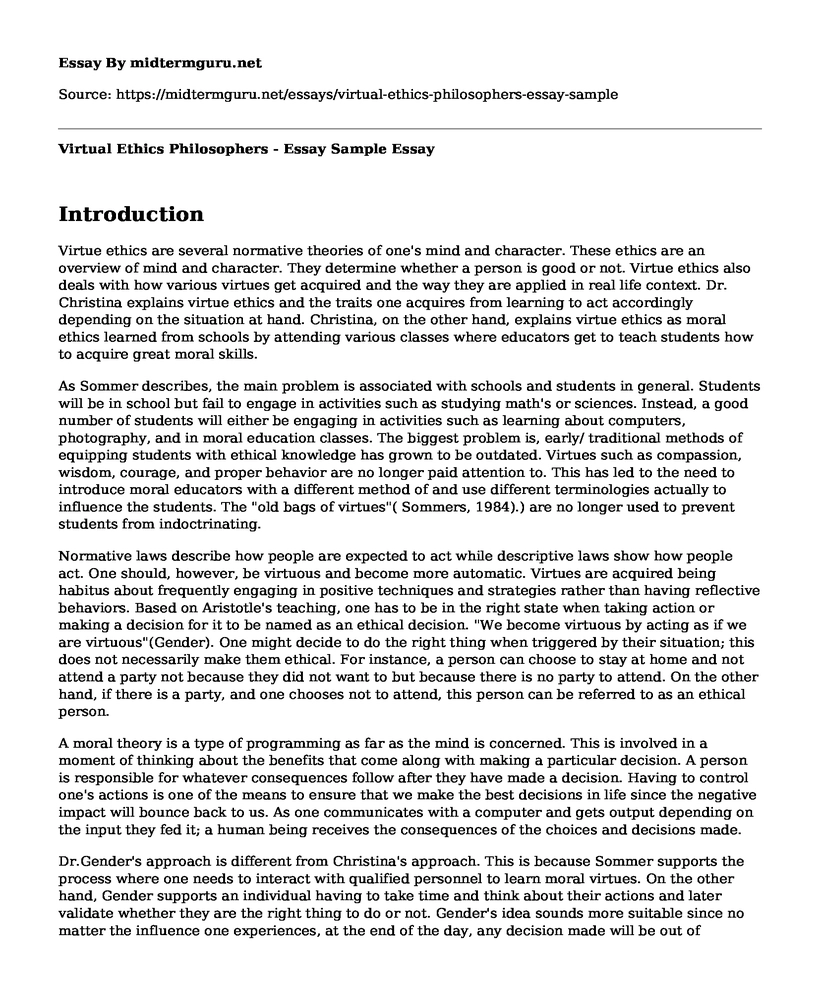Introduction
Virtue ethics are several normative theories of one's mind and character. These ethics are an overview of mind and character. They determine whether a person is good or not. Virtue ethics also deals with how various virtues get acquired and the way they are applied in real life context. Dr. Christina explains virtue ethics and the traits one acquires from learning to act accordingly depending on the situation at hand. Christina, on the other hand, explains virtue ethics as moral ethics learned from schools by attending various classes where educators get to teach students how to acquire great moral skills.
As Sommer describes, the main problem is associated with schools and students in general. Students will be in school but fail to engage in activities such as studying math's or sciences. Instead, a good number of students will either be engaging in activities such as learning about computers, photography, and in moral education classes. The biggest problem is, early/ traditional methods of equipping students with ethical knowledge has grown to be outdated. Virtues such as compassion, wisdom, courage, and proper behavior are no longer paid attention to. This has led to the need to introduce moral educators with a different method of and use different terminologies actually to influence the students. The "old bags of virtues"( Sommers, 1984).) are no longer used to prevent students from indoctrinating.
Normative laws describe how people are expected to act while descriptive laws show how people act. One should, however, be virtuous and become more automatic. Virtues are acquired being habitus about frequently engaging in positive techniques and strategies rather than having reflective behaviors. Based on Aristotle's teaching, one has to be in the right state when taking action or making a decision for it to be named as an ethical decision. "We become virtuous by acting as if we are virtuous"(Gender). One might decide to do the right thing when triggered by their situation; this does not necessarily make them ethical. For instance, a person can choose to stay at home and not attend a party not because they did not want to but because there is no party to attend. On the other hand, if there is a party, and one chooses not to attend, this person can be referred to as an ethical person.
A moral theory is a type of programming as far as the mind is concerned. This is involved in a moment of thinking about the benefits that come along with making a particular decision. A person is responsible for whatever consequences follow after they have made a decision. Having to control one's actions is one of the means to ensure that we make the best decisions in life since the negative impact will bounce back to us. As one communicates with a computer and gets output depending on the input they fed it; a human being receives the consequences of the choices and decisions made.
Dr.Gender's approach is different from Christina's approach. This is because Sommer supports the process where one needs to interact with qualified personnel to learn moral virtues. On the other hand, Gender supports an individual having to take time and think about their actions and later validate whether they are the right thing to do or not. Gender's idea sounds more suitable since no matter the influence one experiences, at the end of the day, any decision made will be out of someone's wish and the desire of their hearts. Depending on, educators may end up misleading masses. Students who would have done better with their intuition end up doing what they are told to do or what everyone in the class is doing. It is good to allow a student to make their own decision at a personal level.
I agree with summer where students are directed in life choices since, in most cases, peer influence may tend to affect most youths. It is positive that young people have a chance of interacting with educated people and grasping some knowledge on how to deal with different situations. I find Sommers claim on the traditional virtues not being a way of enhancing good ethics not convincing. This is because some of these virtues are still used today all over the world without losing the sense of impact yet. The old virtues are still essential and should be used in schools to date.
References
Sommers, C., (1984). Education: Ethics Without Virtue Moral Education in America. The American Scholar, 53(3), 381-389. Retrieved from http://www.jstor.org/stable/41211059Virtue and Habit II https://youtu.be/C8yNxXAm7F4
Cite this page
Virtual Ethics Philosophers - Essay Sample. (2023, Jan 15). Retrieved from https://midtermguru.com/essays/virtual-ethics-philosophers-essay-sample
If you are the original author of this essay and no longer wish to have it published on the midtermguru.com website, please click below to request its removal:
- Essay on Social Ethics in Action
- Essay Sample on Marx's Theory of Capitalist Exploitation
- Essay Sample on Plato and Rachel's Concepts of the Origins and Value of Selfishness
- My Identity Privilege: Benefits & Shaping My Life - Essay Sample
- Reflect and Define: A Professional Counselor's Path to Success - Research Paper
- Article Analysis Essay on Homosexuality and the PIB Argument
- Workplace Ethics Violations: Case Study







